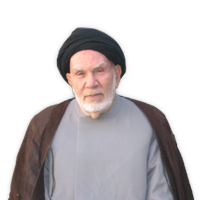Rebirth After Criticism and Research
I n the Name of God
It is right that after a long period of silence in the uproar of his manifestations we should surrender with humility to our Professor as once again an illumination from his side assists us in entering into the gates of science.
What we write is a section of the teachings and researches of esteemed philosopher in Transcendent Theosophy, Professor Mosavi, under teaching of Kifayat al-Usul by Sheikh Mohammad Kazim Khorasani (may Allah exalt his position) after rejections and objections related to the Science of Principles (ilm al-usul).
This research has both an insight into the world of scientists and researchers of basic sciences and a view of philosophy and most importantly, an illumination of all fundamental discussions when commenting on ‘the validity of news from a single source’ or when discussing ‘the validity of suspicion and certainty’ or orders regarding ‘essential and subjective suspicions’ and in religious matters in the rejections and objections of Sahihiun (those who believe that for example if daily prayers are not said with full attention, they will not be accepted) and Aamiha (those who believe that prayers will be accepted even if not said with full attention).
In fact what is the result of engaging in rejections and objections?
Does criticism clarify science or divine matters? Or is it better not to criticize?
In other words, in religious matters, in issues related to monotheism, in philosophical and metaphysical matters or even in legal issues is it better to mention objections and criticisms or to strictly mention the main points and give no one the chance to touch upon these principal issues?
The most important method used by philosophers and metaphysicians in establishment of opinions and clarification of facts is research on different opinions and criticism so that they can reach the truth.
As Muhammad ibn Zakariya Razi in his book Shakkook, which contains his latest opinions, says, “Many have reprimanded me asking why I have criticized parts of writings of Galenus who is higher than me.”
But I say to them, “I highly respect Galenus. I bow down before him. I am aware of his superior knowledge and acknowledge his greatness and high esteem, but at the same time I have to defend knowledge.
He then adds, “Criticism and research is so important that a philosopher does not expect full submission and surrendering from his students but rather expects his students to research. Therefore, I comment on and criticize the opinions of Galenus and in this way teach my students how to criticize”.
He then continues, “I do not consider those who reprimand me to be philosophers since they have neglected philosophers’ custom of research and have accepted the method of scientific repetition and following others. In knowledge, following others is not the principal issue; research is the main issue (It should be mentioned that concerning religious orders, following a religious leader is fundamental unless the person has reached the level of religious leadership).
As Aristotle also mentions, “I highly respect both the truth and Plato, but if there is any disagreement between these two, the truth is more esteemed.
Ibn Ridwan, a great researcher, quotes Porphyrios saying, “Acceptance of unjust and wrong thoughts for us is more difficult than killing our father”.
This is why many intellectuals and scientists have said, “Any person should be a joyful and lively criticizer”.
To further clarify the above we will give an example:
For instance, if we want to discover the reality of the issue of ‘morals and ethics’ we will find after researching the viewpoints of different schools:
In the opinion of Socrates morals have an intellectual aspect.
According to Buddha, morals are destruction and annihilation of our selfish personality. However, Buddhism does not have a spiritual aspect involved.
In the viewpoint of mystics such as Ibrahim Bin Adham and Junaid morals are humility of the body and eyes.
According to Cynics morals are in sufficiency.
Manichaeans believe morals are freedom from pain.
Epicurus believed morals are the opposite of attraction to pleasure.
On the other hand, in the viewpoint of one of the greatest Islamic philosophers, Mulla Sadra, mystic and scientific morals are freedom from egoism.
We then start commenting on and criticizing the different viewpoints and say: Our religion does not accept morals as described by Socrates which is intellectual and has a color of philosophy but is strict, concrete and passive and moulded based on science and is devoid of encouragement and stimulation.
But when we get to our Prophet Mohammad (PBUH) he says:
“I was sent for the completion of ethics”. We try to find out the secret of these words.
If you ask: Does criticism lead all to the truth?
The answer to this question is not so easy.
Conclusion:
It should be said that although criticisms and researches in science with no self interest involved for the purpose of finding the realities, lead a person to the truth, when the same person reaches the level of gnosticism and sees the truth unveiled, he should no more hesitate or doubt or alienate himself from the truth by improper criticisms.
Truly, the possessors of knowledge criticize and are cautious since they have not yet attained the truth, but a person who reaches gnosticism and certitude, he who finds his true companion has no place for hesitation; he should accept with his entire soul.
This is why esteemed philosopher in Transcendent Theosophy, Professor Mosavi, believes:
Any person after passing the stages of science and criticism and research should seek help from an invisible and divine source of assistance. In other words, he should have a rebirth and not only accumulation of knowledge. Meaning that after travelling through the period of scientific research, he should enter the phase of gnostic travelling and be as firm in his opinions as a mountain of light and as gentle and lively as scientific and gnostic pearls and corals and connect to the sanctity (our Imams from Imam Ali to the twelfth Imam, Imam Zaman) and chastity (Fatimah Zahra) and become a sea of light and the truth will be unveiled before his eyes. There he will find that criticism, with all its importance, is not for him but for immature scientists.
Derived from researches of Professor Mosavi under Kifayat al-Usul and various researches under Volume 9 of Mulla Sadra’s book Asfar (Article: Resurrection, Part 17) and Volume 8 of Asfar, Issue of the Spirit, Part 4




Comments
0